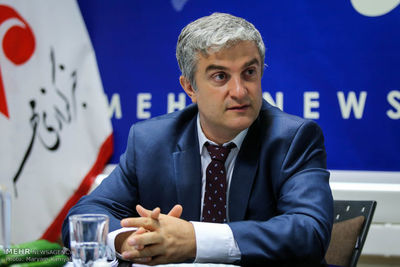In an interview with Mehr news agency, the Danish envoy said that “social consciousness and ambition to raise questions and shed light on how ordinary people live their lives, is, I believe, something Danish and Iranian cinema has in common.”
“This is evident in Asghar Farhadi’s ‘The Salesman’, that won an Oscar for best foreign language film in 2016," he said, "Telling stories that change our understanding of the lives and struggles of other people, is an important part of the long and proud Iranian cinema history."
“I believe this shows how much we have in common, and how much we can learn from each other – and about each other - through cultural exchanges,” Ambassador Annan underlined.
Addressing Iran-Denmark cultural cooperation, he said that “it is our sincere hope that this Festival, as well as future cultural events, will foster a flow of ideas, thoughts and knowledge between Iran and the European countries.”
“We will, on our part, continue to encourage Danish historians, archaeologists, musicians, theater groups, scholars and filmmakers to visit Iran and contribute to the continued cultural exchange between our two countries,” the Danish Ambassador vowed.
Explaining about this year’s European film week, he continued to say that “since last year, The European Film festival has increased number of cities and number of participating countries by 25 percent. This shows the importance that the EUNIC cluster attach to developing cultural ties with Iran and its people.”
“We strongly believe that cultural exchange is the key element to deepen our mutual understanding and create opportunities for bridge building,” he noted.
Answering a question about this year’s Danish contribution to the event Ambassador Annan went on to say that “It was a pleasure for me to participate in the official opening ceremony in Tehran on June 8.”
“This year’s Danish Contribution: ‘A Fortunate Man’, directed by Oscar and Golden Globe-winning director Bille August. The movie is based on a novel written by Nobel Prize Winning author Henrik Pontoppidan (won the prize in 1917). It is a social drama taking place in the late 19th century. The story is about the bright young man, who chooses to leave his devout Christian family in the western part of Denmark to go study engineering in the Capital of Copenhagen. The story raises the difficult questions, every person is bound to consider: how to deal with your roots while making your own choices in life – and whether you can, after all, ever completely turn your back on your roots. At the same time, the story is deeply socially conscious, and lets the spectators reflect upon the significance of social structures and how each person in one way or another must relate to these during their life.”
“Social drama and a social consciousness play an important role in Danish cinema, which ‘A Fortunate Man’ is a great example of. The last two year’s contributions to the European Film Festival (The Day Will Come and The Hour of the Lynx) also both exemplify the Danish tradition of social drama and how films can ask the difficult questions and offer new perspectives. These films can change how we relate to ourselves and the societies we live in,” he added.
He in the end explained about the European Union National Institutes for Culture (EUNIC), who is in charge of running the event in Iran in cooperation with the Art & Experience Cinema Institute.
“Since its founding in 2006, the national clusters of the European Union National Institutes of Culture (EUNIC) have been building trust and understanding between the peoples of Europe and the rest of the world through culture. Denmark has been a steadfast participant in the European Film Festival here in Iran,” he said.
The European Film Week 2019 – that started on June the 8th - includes 19 participating European countries and is taking place in 8 cities, namely: Babol, Isfahan, Kerman, Kish, Mashhad, Tabriz, Tehran and Shiraz.
By pooling together resources and expertise of 23 EU Member States and European partner countries, EUNIC Iran works to build cultural bridges between Europe and Iran, believing that cultural exchange is the key element to deepen our understanding of each other.
This year, Austria, Bulgaria, Belgium, Cyprus, Denmark, Finland, Germany, Greece, Hungary, Italy, Norway, the Netherlands, Poland, Portugal, Sweden, Slovenia, Slovakia, Spain and Switzerland are showing cinematic masterpieces from their countries. Furthermore, film makers from Cyprus, the Netherlands, Sweden and Switzerland are holding stimulating workshops that may even lead to innovative collaborations with film makers from Iran.
Compared to last year, the 2019 edition of the European Film Week experienced an increase in both the number of participating countries and in the number of cities by 25 percent, which shows the great importance that the European Union and associated countries, Norway and Switzerland, attach to developing cultural relations with Iran and Iranians.
Source: Mehr News

